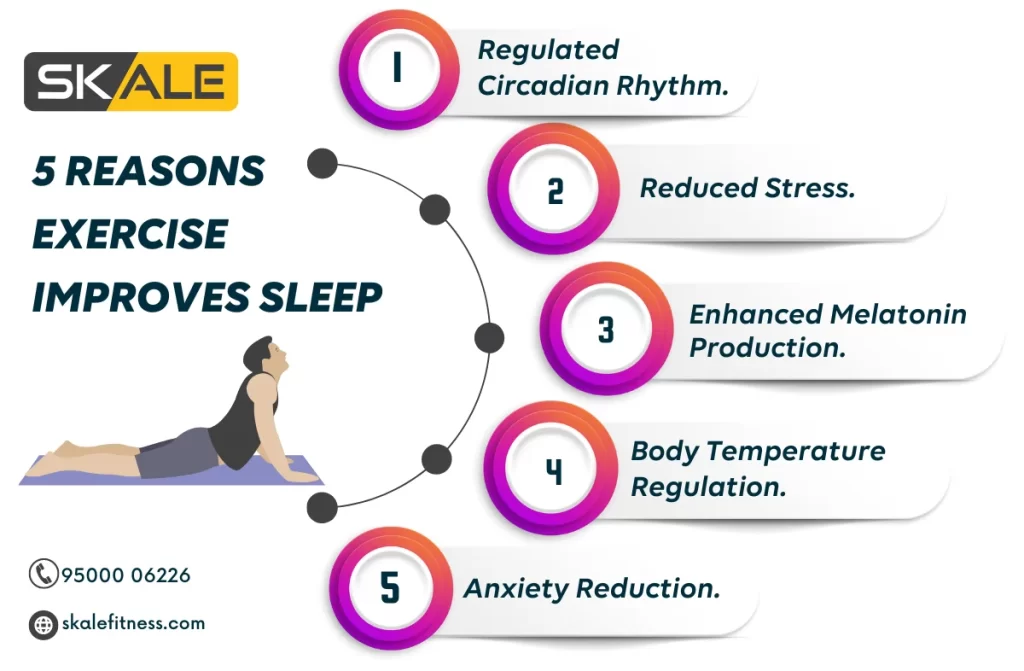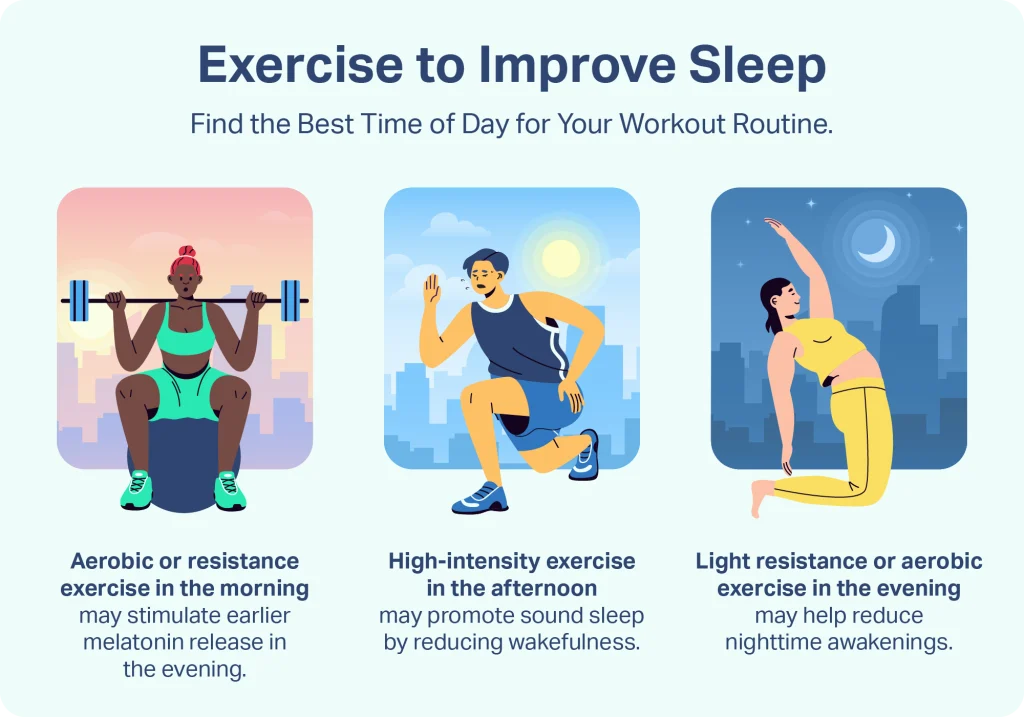In our fast-paced world, getting a good night’s sleep has become a luxury for many. Stress, irregular routines, and sedentary lifestyles often contribute to sleep disturbances. In this blog post, we’ll explore how exercising for better sleep would be of great help and discuss some of the best exercises to help you achieve that coveted restorative rest. While there are various factors that influence sleep quality, incorporating regular physical activity into your routine can have a positive impact on your sleep patterns.
The Connection Between Exercise and Sleep
Performing exercise for insomnia has long been recognized for its numerous health benefits of exercise, including its positive effects on sleep. Engaging in physical activity helps regulate the body’s circadian rhythm, or internal clock, which plays a crucial role in determining when we feel awake and when we feel tired.
Regular exercise reduces stress and anxiety, two common culprits of sleep disturbances. Additionally, exercising for better sleep increases the body’s core temperature, and as it cools down post-exercise, it signals to the body that it’s time to sleep.

Best Exercising for Better Sleep
- Aerobic Exercises: This exercising for better sleep gets your heart pumping and improves cardiovascular health. Engaging in activities such as jogging, brisk walking, cycling and swimming can be fantastic options. Work towards achieving a minimum of 150 minutes of aerobic exercise at a moderate intensity each week. However, try to complete your workout several hours before bedtime to give your body enough time to wind down.
- Yoga: Yoga combines gentle stretches, controlled breathing, and meditation, making it an ideal choice for promoting relaxation and reducing stress. Exercising for better sleep by performing certain yoga poses, like Child’s Pose and Legs Up the Wall, can help activate the body’s parasympathetic nervous system, which induces a state of calmness and prepares you for sleep.
- Strength Training: Incorporating strength training into your routine while considering exercise for insomnia like weight lifting or bodyweight exercises, can improve overall sleep quality. Avoid doing intense strength training too close to bedtime, as it may have an energizing effect.
- Tai Chi: Tai Chi is a low-impact exercising for better sleep that combines slow, flowing movements with deep breathing and meditation. It has been linked to improved sleep quality, reduced insomnia symptoms, and enhanced overall well-being. Its gentle nature makes it suitable for people of all fitness levels.
- Stretching Routine: Simple stretching exercise for insomnia can help alleviate muscle tension, which often accumulates throughout the day. Incorporate a gentle stretching routine before bedtime to relax your muscles and create a sense of calm.
- Mindfulness and Meditation: While not traditional exercises, mindfulness and meditation techniques contribute to better sleep by calming the mind and reducing stress. Practising exercising for better sleep like deep breathing, progressive muscle relaxation, and guided imagery can be particularly effective.
- Cardio Dance: If you enjoy dancing, cardio dance classes or dancing to your favorite tunes at home can be an enjoyable way to engage in physical activity. This exercising for better sleep not only burns calories but also releases endorphins, promoting a positive mood conducive to better sleep.

How Exercise May Help You Sleep
Engaging in regular physical activity plays a significant role in improving sleep quality. Here’s how exercise positively impacts your rest:
- Increases Sleep Duration: People who exercise regularly tend to experience longer, deeper sleep compared to those who are sedentary.
- Enhances Sleep Efficiency: Exercise can make it easier to fall asleep and reduces the likelihood of waking up throughout the night.
- Regulates Your Sleep Cycle: Physical activity influences your circadian rhythm, helping your body align with natural sleep-wake cycles.
- Reduces Sleep Disorders: Studies have shown that exercise can be particularly beneficial for people with chronic sleep disorders like insomnia and sleep apnea.
When you engage in aerobic exercises such as walking, swimming, or cycling, your body’s internal temperature rises. As it cools down post-exercise, this drop in temperature triggers feelings of drowsiness, helping you relax and fall asleep faster. be a game-changer, as it helps decrease the time spent awake at night and boosts overall sleep quality.
Is It Harmful to Exercise Before Bed?
There’s often a debate about whether exercising too close to bedtime can negatively impact sleep. While it’s true that vigorous exercise can elevate heart rate and stimulate the nervous system, not all late-night workouts will keep you up at night. The impact largely depends on the type of exercise and the individual’s sensitivity to physical activity.
- High-Intensity Exercise: Intense workouts like running, weightlifting, or HIIT sessions can increase adrenaline and cortisol levels, potentially making it harder to wind down.
- Light to Moderate Exercise: On the other hand, low-impact activities like stretching, yoga, or walking can actually help relax the mind and body before bed, making it easier to fall asleep.
Tips for Evening Exercise:
- If you prefer to work out in the evening, try to finish at least 1-2 hours before bedtime to allow your heart rate and body temperature to return to normal levels.
- Focus on calming exercises like stretching or light yoga, which can promote relaxation without overstimulating the nervous system.
Ultimately, if you notice that high-intensity exercise close to bedtime interferes with your sleep, it might be best to adjust the timing of your workouts. However, light to moderate Exercising-for-better-sleep can be a great way to relax and prepare your body for rest.
Exercise for Insomnia
If you suffer from insomnia, exercise can be an effective, natural way to help alleviate symptoms. Research has shown that people with insomnia who participate in moderate aerobic exercises report:
- Falling asleep quicker
- Experiencing fewer nighttime awakenings
- Waking up feeling more refreshed
Activities such as yoga, tai chi, or light jogging can be particularly helpful for those with insomnia, as these exercises focus on breathing, reducing stress, and calming the nervous system. The benefits of Exercise for Insomnia extend beyond just improving sleep quality; they also enhance your overall mental and physical health.
Health Benefits of Exercise
Beyond sleep, exercise offers numerous Health Benefits of Exercise that promote overall wellness:
- Boosts Immune System: Regular exercise strengthens your immune system, helping you fight off illnesses more effectively.
- Improves Cardiovascular Health: Aerobic exercise increases heart and lung capacity, reducing the risk of heart disease.
- Enhances Cognitive Function: Physical activity stimulates brain function, improving memory, focus, and mental clarity.
- Reduces the Risk of Chronic Diseases: Exercise lowers the risk of conditions like diabetes, hypertension, and obesity.
When you commit to regular exercise, not only will you experience better sleep, but you’ll also enjoy a wide range of health benefits of exercise that can improve your quality of life.
Stress Reduction
Stress is one of the most significant factors that negatively impact sleep quality. Exercise is a powerful stress-buster for several reasons:
- Releases Endorphins: Physical activity stimulates the production of endorphins, chemicals in your brain that naturally elevate your mood and relieve stress.
- Lowers Cortisol Levels: Regular exercise helps lower cortisol, the hormone associated with stress.
- Provides Mental Clarity: Activities such as running or swimming allow you to clear your mind, helping to manage anxiety and depression.
Even moderate exercises like walking or cycling can reduce stress levels and create a sense of relaxation that promotes better sleep. By incorporating exercise into your daily routine, you can manage stress more effectively and sleep more soundly at night.
The Best Times to Exercise for Healthy Sleep
Timing your workouts can significantly influence your sleep patterns. While exercising at any time of the day can be beneficial, certain times may be more effective for those seeking to improve sleep quality.
1. Morning Workouts:
Morning exercise is generally considered the best time for boosting sleep quality. Early workouts help reset the circadian rhythm by signaling to your body that it’s time to be awake. Additionally, exercising in the morning exposes you to natural light, which helps regulate sleep patterns and promotes better rest at night.
- Benefits of morning exercise for sleep:
- Encourages better sleep quality and duration.
- Increases alertness throughout the day.
- Helps regulate your internal clock for improved consistency in sleep.
2. Afternoon Workouts:
Afternoon workouts are another excellent option, especially for those who find it challenging to exercise in the morning. During this time, body temperature and physical performance tend to peak, leading to a more effective workout and deeper sleep.
- Benefits of afternoon exercise for sleep:
- Improves sleep latency (how fast you fall asleep).
- Boosts energy levels without interfering with nighttime relaxation.
- Encourages muscle recovery through increased blood flow.
3. Evening Workouts:
As mentioned earlier, evening exercise is still beneficial for sleep, provided it is not too close to bedtime or overly intense. If you prefer working out in the evening, opt for calming activities like yoga or stretching that relax your muscles and ease tension.
- Benefits of evening exercise for sleep:
- Helps unwind after a long day.
- Eases stress and tension that may hinder sleep.
- Light activities promote sleep readiness.
ordination, and higher endurance levels, allowing you to push harder and perform better during physical activity.
Conclusion
To conclude, exercising for better sleep requires consistency and a well-rounded approach. Remember that individual preferences and physical conditions vary, so it’s important to choose exercises that you enjoy and that suit your fitness level. Prioritize creating a regular exercise routine that aligns with your daily schedule, and follow it. This will help you have a positive impact on your sleep patterns, leaving you feeling more rested, refreshed, and ready to take on the day.




